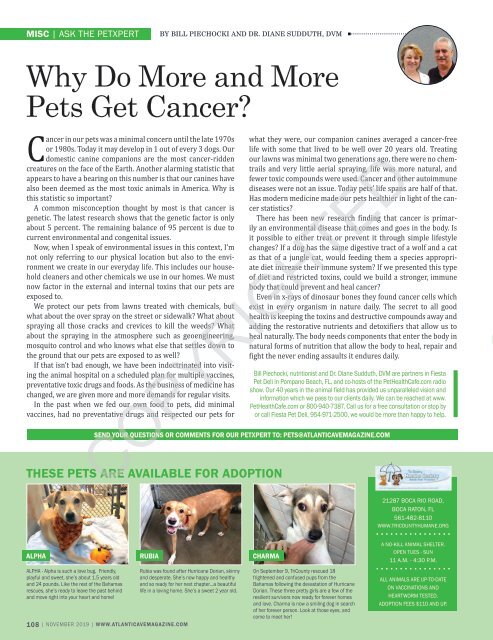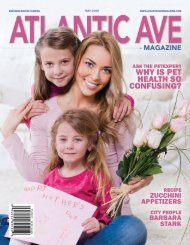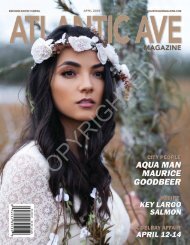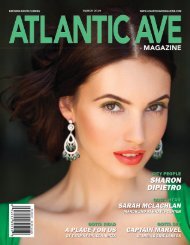Atlantic Ave Magazine November 2019
Create successful ePaper yourself
Turn your PDF publications into a flip-book with our unique Google optimized e-Paper software.
misc | ask the petxpert<br />
BY Bill Piechocki and Dr. Diane Sudduth, DVM<br />
Why Do More and More<br />
Pets Get Cancer?<br />
Cancer in our pets was a minimal concern until the late 1970s<br />
or 1980s. Today it may develop in 1 out of every 3 dogs. Our<br />
domestic canine companions are the most cancer-ridden<br />
creatures on the face of the Earth. Another alarming statistic that<br />
appears to have a bearing on this number is that our canines have<br />
also been deemed as the most toxic animals in America. Why is<br />
this statistic so important?<br />
A common misconception thought by most is that cancer is<br />
genetic. The latest research shows that the genetic factor is only<br />
about 5 percent. The remaining balance of 95 percent is due to<br />
current environmental and congenital issues.<br />
Now, when I speak of environmental issues in this context, I‘m<br />
not only referring to our physical location but also to the environment<br />
we create in our everyday life. This includes our household<br />
cleaners and other chemicals we use in our homes. We must<br />
now factor in the external and internal toxins that our pets are<br />
exposed to.<br />
We protect our pets from lawns treated with chemicals, but<br />
what about the over spray on the street or sidewalk? What about<br />
spraying all those cracks and crevices to kill the weeds? What<br />
about the spraying in the atmosphere such as geoengineering,<br />
mosquito control and who knows what else that settles down to<br />
the ground that our pets are exposed to as well?<br />
If that isn’t bad enough, we have been indoctrinated into visiting<br />
the animal hospital on a scheduled plan for multiple vaccines,<br />
preventative toxic drugs and foods. As the business of medicine has<br />
changed, we are given more and more demands for regular visits.<br />
In the past when we fed our own food to pets, did minimal<br />
vaccines, had no preventative drugs and respected our pets for<br />
what they were, our companion canines averaged a cancer-free<br />
life with some that lived to be well over 20 years old. Treating<br />
our lawns was minimal two generations ago, there were no chemtrails<br />
and very little aerial spraying, life was more natural, and<br />
fewer toxic compounds were used. Cancer and other autoimmune<br />
diseases were not an issue. Today pets’ life spans are half of that.<br />
Has modern medicine made our pets healthier in light of the cancer<br />
statistics?<br />
There has been new research finding that cancer is primarily<br />
an environmental disease that comes and goes in the body. Is<br />
it possible to either treat or prevent it through simple lifestyle<br />
changes? If a dog has the same digestive tract of a wolf and a cat<br />
as that of a jungle cat, would feeding them a species appropriate<br />
diet increase their immune system? If we presented this type<br />
of diet and restricted toxins, could we build a stronger, immune<br />
body that could prevent and heal cancer?<br />
Even in x-rays of dinosaur bones they found cancer cells which<br />
exist in every organism in nature daily. The secret to all good<br />
health is keeping the toxins and destructive compounds away and<br />
adding the restorative nutrients and detoxifiers that allow us to<br />
heal naturally. The body needs components that enter the body in<br />
natural forms of nutrition that allow the body to heal, repair and<br />
fight the never ending assaults it endures daily.<br />
Bill Piechocki, nutritionist and Dr. Diane Sudduth, DVM are partners in Fiesta<br />
Pet Deli in Pompano Beach, FL, and co-hosts of the PetHealthCafe.com radio<br />
show. Our 40 years in the animal field has provided us unparalleled vision and<br />
information which we pass to our clients daily. We can be reached at www.<br />
PetHealthCafe.com or 800-940-7387. Call us for a free consultation or stop by<br />
or call Fiesta Pet Deli, 954-971-2500, we would be more than happy to help.<br />
SEND YOUR Questions OR COMMents for OUR PETXPERT TO: Pets@ATLANTICAVEMAGAZINE.COM<br />
COPYRIGHTED<br />
these pets are available for adoption<br />
21287 Boca Rio Road,<br />
Boca Raton, FL<br />
561-482-8110<br />
www.tricountyhumane.org<br />
alpha<br />
ALPHA - Alpha is such a love bug. Friendly,<br />
playful and sweet, she’s about 1.5 years old<br />
and 24 pounds. Like the rest of the Bahamas<br />
rescues, she’s ready to leave the past behind<br />
and move right into your heart and home!<br />
RUBIA<br />
108 | november <strong>2019</strong> | www.<strong>Atlantic</strong><strong>Ave</strong><strong>Magazine</strong>.com<br />
Rubia was found after Hurricane Dorian, skinny<br />
and desperate. She’s now happy and healthy<br />
and so ready for her next chapter...a beautiful<br />
life in a loving home. She’s a sweet 2 year old.<br />
Charma<br />
On September 9, TriCounty rescued 18<br />
frightened and confused pups from the<br />
Bahamas following the devastation of Hurricane<br />
Dorian. These three pretty girls are a few of the<br />
resilient survivors now ready for forever homes<br />
and love. Charma is now a smiling dog in search<br />
of her forever person. Look at those eyes, and<br />
come to meet her!<br />
A NO-KILL animal shelter.<br />
Open Tues - Sun<br />
11 a.m. - 4:30 p.m.<br />
All animals are up-to-date<br />
on vaccinations and<br />
heartworm tested.<br />
Adoption fees $110 and up.

















